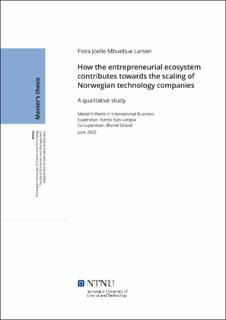| dc.contributor.advisor | Longva, Kjersti Kjos | |
| dc.contributor.advisor | Strand, Øivind | |
| dc.contributor.author | Larsen, Flora Joelle Mbuebue | |
| dc.date.accessioned | 2022-08-25T17:19:20Z | |
| dc.date.available | 2022-08-25T17:19:20Z | |
| dc.date.issued | 2022 | |
| dc.identifier | no.ntnu:inspera:115633639:115634959 | |
| dc.identifier.uri | https://hdl.handle.net/11250/3013638 | |
| dc.description.abstract | Denne oppgaven tar sikte på å utforske hvordan det entreprenørielle økosystemet bidrar til skalering av norske teknologiselskaper. Den norske regjeringen har gjennom årene iverksatt tiltak for å øke nivået på gründervirksomhet i Norge. Dette gjør dem til en viktig interessent for norske gründere. Å identifisere viktige interessenter og studere hvordan de bidrar til det entreprenørielle økosystemet er et verdifullt tillegg til konseptet rundt entreprenørielle økosystemer, ettersom det er begrenset empirisk forskning som viser årsak og virkning. Et interessant aspekt ved forskningen er at den følger et tredelt perspektiv som gir et innblikk i hvordan interessentene «Støtteorganisasjoner» og «Finansielle ressurser» ser på sitt eget bidrag, samt hvordan gründerne ser på disse interessentenes bidrag.
De viktigste teoretiske rammeverkene som brukes er Shane & Venkataraman (2000)’s konsept for «Discover, explore and exploit», for å studere gründerprosessen. Isenberg «Domains of entrepreneurship ecosystem» (2011), samt «MIT stakeholder model» (Budden & Murray, 2019) brukes til å definere viktige interessenter i Norge. Andre teorier som studerer rollene til de ulike interessentene som er identifisert for det norske entreprenørskapsøkosystemet, brukes også.
Oppgaven følger en kvalitativ tilnærming, der semistrukturerte intervjuer gjennomføres med 16 informanter: 4 entreprenører, 7 informanter fra banker og venture capital og 5 informanter danner støtteorganisasjoner.
Hovedfunnet i denne oppgaven er den brede rollen som myndighetene spiller som en interessent og det store bidraget de gir til det entreprenørielle økosystemet. Kunnskapsdeling, finansiering og engasjement i et utvidet forretningsnettverk ser ut til å være viktige medvirkende faktorer for skalering for teknologibedrifter. Og myndighetene som interessent kan gi alt dette til gründere. Økonomiske ressurser er nødvendige for at gründerne i utvalget skal kunne skalere, men de ser imidlertid ut til å foretrekke investert kapital fremfor lånt kapital. I de tilfellene de mottar lånt kapital, mottar de normalt dette fra en statlig støtteorganisasjon. For kunnskapsdeling og tilgang til et utvidet nettverk, har de en tendens til å søke inkubatorer og statlige støtteorganisasjoner. Venturekapitaler blir verdsatt for kapitalen de tilfører virksomhetene, så vel som deres bidrag gjennom sin plass i styret samt deres aktive rolle i virksomheten. Denne forskningen bidrar til den begrensede forskningen på entreprenørielle økosystemer og er et empirisk bidrag for å hjelpe til med å forstå det norske entreprenørielle økosystemet. | |
| dc.description.abstract | This thesis aims to explore how the entrepreneurial ecosystem contribute to the scaling of Norwegian tech companies. The Norwegian government has over the years taken measures to increase the level of entrepreneurial activities in Norway. This makes them an important stakeholder for Norwegian entrepreneurs. Identifying important stakeholders and studying how they contribute to the entrepreneurial ecosystem is a valuable addition to the concept of entrepreneurial ecosystems, as there is limited empirical research that showcases cause and effect. An interesting aspect of the research it that it follows a threefold perspective which gives an insight into how the stakeholders “Support Organizations” and “Financial Resources” view their own contribution, as well as how the entrepreneurs view those stakeholders’ contribution.
The main theoretical frameworks that are applied are Shane & Venkataraman’s (2000) concept of discovery, explore and exploit, to study the entrepreneurial process. Isenberg (2011)’s domains of entrepreneurship ecosystem (2011) as well as The MIT stakeholder model (Budden & Murray, 2019) are used to help define important stakeholders in Norway. Other theories that study the roles of the different stakeholders that are identified for the Norwegian entrepreneurship ecosystem, are also applied.
The thesis follows a qualitative approach, where semi-structured interviews are conducted on 16 informants: 4 entrepreneurs, 7 informants from banks and venture capitals, and 5 informants form support organizations.
The main finding in this thesis is the broad role that the government plays as a stakeholder and the big contribution that they provide to the entrepreneurial ecosystem. Knowledge sharing, financing, and engaging in an extended business network seem to be important contributing factors towards scaling for tech businesses. And the government as a stakeholder can provide all of this to entrepreneurs. Financial resources are necessary for the entrepreneurs in the sample to be able to scale, they do however seem to prefer invested capital, over borrowed capital. In the case that they receive borrowed capital, they normally receive this from a governmental support organization. For knowledge sharing and access to an extended network, they tend to seek incubators and governmental support organizations. Venture capitals are appreciated for the capital that they add to the businesses, as well as their contribution through their seat on the board as well as their active role in the business. This adds to the limited research on entrepreneurial ecosystem and is an empirical contribution to help understand the Norwegian Entrepreneurial ecosystem. | |
| dc.language | eng | |
| dc.publisher | NTNU | |
| dc.title | How the entrepreneurial ecosystem contributes to the scaling of Norwegian technology companies | |
| dc.type | Master thesis | |
